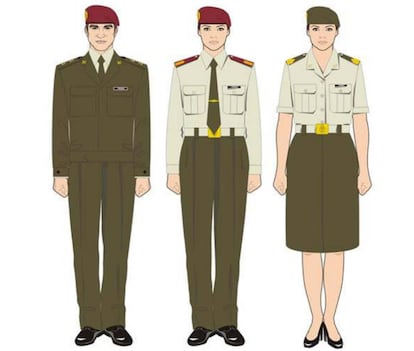How a tattoo can stop you joining the Spanish army – if you’re a woman
Aspiring recruit Estela Martín has been excluded from the process to join the armed forces due to a small flower on her foot. Men, meanwhile, are subject to different treatment

Estela Martín, a 30-year-old from Madrid with a bachelor’s degree in psychology, meets all the requirements to join the Spanish Army. There is just one small obstacle standing between her and her dream job: a seven-centimeter tattoo on her right foot.
When the chairman of the selection committee saw her in a swimsuit on June 19 for her swimming trials, he was adamant: Martín was unsuited to join the military. If she were to wear a skirt, the tattoo – a flower – would be exposed. And visible tattoos are expressly forbidden while wearing any uniform of the Armed Forces, according to army regulations.
Defense sources said there will be a review of uniforms policy to bring it up to speed with the times
Martín felt humiliated. She had quit her job at a hospital to study for the official examinations to join the army’s health department. She had been burning up her savings for two years in order to prepare for the tests.
It seems to be of little relevance that many members of La Legión, an elite military unit, have every inch of their bodies covered in tattoos, as is clearly visible when they march in official parades.
The no-tattoo rule is only applicable to new recruits, not to individuals who are already members of the army. What’s more, the rules are not the same for men and women.

Another woman was also left out of the same recruitment process as Estela Martín because of a tattoo on her foot. Yet two men who sported tattoos – one on his heel, the other one on his calves – were waved through.
The chairman of the selection committee told Martín that men’s legs could be tattooed from the ankle to the groin because their pants would cover the artwork. Regulations state that women may choose to wear pants or skirts on a daily basis, but skirts are mandatory on occasions when etiquette dress is called for. Martín notes that this uniform includes black tights, which would effectively conceal any leg or foot tattoos.
“I would like to know what’s the use of forcing women in the military to wear a skirt and high heels, other than preserving their image as mere ornaments, with their abilities and talents taking second place to their looks,” says Martín.
But her protests fell on deaf ears. The chairman of the jury, a lieutenant colonel, insisted that “your superior can force you to wear a skirt even if you don’t want to,” and admitted that “the surface of tattoo-free skin that is demanded of a woman is much higher than for a man.”
Estela Martín appealed, and a week later the same lieutenant colonel asked her to put on a dress shoe to see whether her tattoo was visible or not. Martín refused, saying that the shoe was too small for her and claiming that she was being discriminated against and treated in a way that violated the principle of equality between men and women, which the selection committee has an obligation to uphold.

The lieutenant colonel told her to appeal to a higher authority, and she did. Martín has written to Defense Minister Margarita Robles, asking to be allowed to finish her examinations along with the other candidates while her situation is resolved. Martín notes that she will be unable to apply again in future, as she will be over the age limit.
Sources at the Defense Ministry declined to comment on the case, but said that “it will be carefully analyzed” and that there will be “a review of uniforms policy to bring it up to speed with the times.”
English version by Susana Urra.
Tu suscripción se está usando en otro dispositivo
¿Quieres añadir otro usuario a tu suscripción?
Si continúas leyendo en este dispositivo, no se podrá leer en el otro.
FlechaTu suscripción se está usando en otro dispositivo y solo puedes acceder a EL PAÍS desde un dispositivo a la vez.
Si quieres compartir tu cuenta, cambia tu suscripción a la modalidad Premium, así podrás añadir otro usuario. Cada uno accederá con su propia cuenta de email, lo que os permitirá personalizar vuestra experiencia en EL PAÍS.
¿Tienes una suscripción de empresa? Accede aquí para contratar más cuentas.
En el caso de no saber quién está usando tu cuenta, te recomendamos cambiar tu contraseña aquí.
Si decides continuar compartiendo tu cuenta, este mensaje se mostrará en tu dispositivo y en el de la otra persona que está usando tu cuenta de forma indefinida, afectando a tu experiencia de lectura. Puedes consultar aquí los términos y condiciones de la suscripción digital.









































